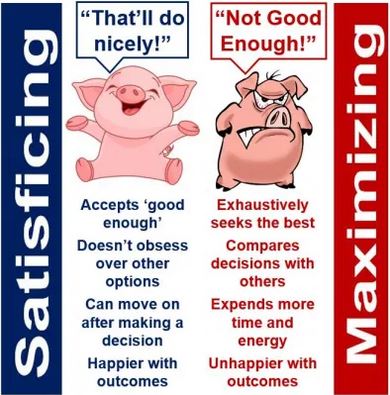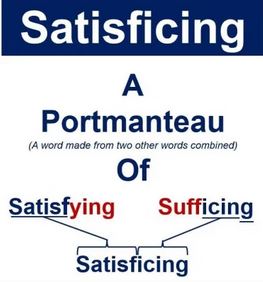Satisficing
When Near Enough Is Good Enough
Job Done!

Satisficing - Overview
Satisficing is a heuristic - a practical shortcut - for making decisions that aims for a satisfactory or adequate result, rather than the optimal solution.
It is:
- A decision-making process that strives for adequate rather than perfect results.
- A pragmatic approach that saves on time, resources and costs by narrowing the range of options considered to achieve an adequate outcome.
- Not engaging in intensive, complex, and exhaustive efforts to attain the optimised solution.
- Adopting a more minimalist approach that looks for the first solution that meets basic acceptable outcomes.
The opposite decision-making process to satisficing is optimisation [or maximisation] where you collate and analyse all the necessary data that is required to make the optimal choice.
According to traditional economy theory, this is the choice that gives the highest level of satisfaction [maximum utility].
I am British, and I recall when I first visited the US approximately 35 years ago. I was in a mall at lunchtime looking to buy a coffee and a sandwich for my lunch, and I was completely overwhelmed with the range of choices.
As I recall, the food vendor offered me about 30 different types of bread and filling for my sandwich and a similar number of choices for the coffee! I felt like screaming: "just give me a black coffee and cheese sandwich on brown bread"!
Origin of the word Satisficing

The term satisficing was introduced by Herbert A. Simon (1916-2001), an American economist, political scientist, sociologist and computer scientist.
He first coined the word in his 1956 paper, “Rational Choice and the Structure of the Environment”, he wrote:
“It appears probable that, however adaptive the behavioral of organisms in learning and choice situations, this adaptiveness falls short of the ideal of ‘maximizing’ postulated in economic theory. Evidently, organisms adapt well enough to ‘satisfice’; they do not, in general, ‘optimize’.”
Satisficing and Task Optimisation

- This is about knowing the point at which continued focused activity on a task takes you beyond the point which meets your predetermined requirements.
- This is about knowing the point at which an essential task becomes inessential.
An example of task optimisation
In Speed and Velocity I gave the example of the creation of this article and its posting on this webpage.
I am currently working to a schedule of creating and posting one webpage per day.
In order to achieve this successfully I need to accomplish a series of tasks in a specific sequence and within a defined time window.
So, this morning I knew that my subject for today was "speed and velocity". To achieve my objective for today there are 3 main tasks.
1] Reading and research of subject material for this article and considering my own real life experiences in this area.
2] Drafting and formatting the material.
3] Posting this material as a webpage.
I have found from considerable experience of this process that I need about two to three hours for steps 2 and 3, but unless I am careful step 1 can take far longer than it should. This morning I found myself getting drawn deeper and deeper into the physics of this subject, which as a non-academic I found interesting and challenging.
After a while I realised that I was wasting time and continued research was beyond the scope of this article. So, in practical terms, I had reached the optimum allocation of resource and effort that was required to complete step 1.
I was able to do this because I have extensive experience of this process and I have an established set of criteria that enables me to make this call.
How to satisfice a decision
- Establish your requirements — work out upfront what you’ll need to be satisfied.
- Allocate the resources - decide just how much time, energy and resource you’ll need to put in.
- Search for an option - that meets those requirements within the allocated resources.
- Stop when you find a satisfactory option — satisficed!
You
need to be very clear about the optimum allocation of resource to a task that is required to meet your predetermined requirements. You also need to establish clear metrics that enable you to know when you have reached that optimum point.
Further Reading:
The ETTO Principle - Why Near Enough Can Be Good Enough
Return from "Satisficing" to: Mental Models
LATEST ARTICLES
The Inner Weight of Shame - Sustained By Attentional Fixation
 A Mind That Is Continuously Engaged In Self-Surveillance. Shame is one of the heaviest inner burdens a human being can carry. It does not announce itself loudly or demand attention through drama. Inst…
A Mind That Is Continuously Engaged In Self-Surveillance. Shame is one of the heaviest inner burdens a human being can carry. It does not announce itself loudly or demand attention through drama. Inst…Does Prayer Work? The Psychology of Prayer, Meditation and Outcomes
 Reality Is A Complex System Of Countless Interactions - Including Yours. So does prayer work? The problem is that the question itself is usually framed in a way that guarantees confusion. We tend to a…
Reality Is A Complex System Of Countless Interactions - Including Yours. So does prayer work? The problem is that the question itself is usually framed in a way that guarantees confusion. We tend to a…Living in Survival Mode Without Surrendering Mental Authority
Living in Survival Mode Without Surrendering Mental Authority
 Clear Thinking When You’re Just Trying to Stay Afloat. Many people today are overwhelmed because they are living in survival mode - not temporarily, but as a persistent condition of life. For many, th…
Clear Thinking When You’re Just Trying to Stay Afloat. Many people today are overwhelmed because they are living in survival mode - not temporarily, but as a persistent condition of life. For many, th…Manifestation Without Magic: A Practical Model
 Manifestation without magic is not a softer or more intellectual version of popular manifestation culture. It is a different model altogether. Popular manifestation teachings tend to frame reality as…
Manifestation without magic is not a softer or more intellectual version of popular manifestation culture. It is a different model altogether. Popular manifestation teachings tend to frame reality as…Staying Committed When You Can't See Progress - The Psychology of Grit
 Uncertainty Is Not The Absence Of Progress, Only The Absence Of Reassurance. One of the most destabilising experiences in modern life is not failure, but uncertainty and staying committed when you can…
Uncertainty Is Not The Absence Of Progress, Only The Absence Of Reassurance. One of the most destabilising experiences in modern life is not failure, but uncertainty and staying committed when you can…The Battle For Your Mind - How To Win Inner Freedom In A Digital Age Of Distraction
 From External Events to Inner Events. We often think of “events” as things that happen out there: the traffic jam, the rude comment, the delayed email reply. But what truly shapes our experience is wh…
From External Events to Inner Events. We often think of “events” as things that happen out there: the traffic jam, the rude comment, the delayed email reply. But what truly shapes our experience is wh…How to See Your Thoughts Without Becoming the Story
 A Practical Guide to Thought-Awareness. You can spend your life inside the stories of your mind without ever learning how to see your thoughts clearly and objectively. Most of the stuff we tell oursel…
A Practical Guide to Thought-Awareness. You can spend your life inside the stories of your mind without ever learning how to see your thoughts clearly and objectively. Most of the stuff we tell oursel…The Collison Decision Matrix - A Simple Framework for Better Choices
 The Collison Decision Matrix Is A Practical Everyday Thinking Tool. Most of us spend a surprising amount of time worrying about decisions. From small ones such as what to wear, what to eat, what to te…
The Collison Decision Matrix Is A Practical Everyday Thinking Tool. Most of us spend a surprising amount of time worrying about decisions. From small ones such as what to wear, what to eat, what to te…The Power Of Asking The Right Question
 The Power Of Asking The Right Question Lies In The Quest For Insight. To experience the power of asking the right question you must develop the practice of asking questions. The best way to improve th…
The Power Of Asking The Right Question Lies In The Quest For Insight. To experience the power of asking the right question you must develop the practice of asking questions. The best way to improve th…Site Pathways
 Here is a site pathway to help new readers of Zen-Tools navigate the material on this site. Each pathway is based around one of the many key themes covered on this site and contain a 150 word introduc…
Here is a site pathway to help new readers of Zen-Tools navigate the material on this site. Each pathway is based around one of the many key themes covered on this site and contain a 150 word introduc…How To Live With Contradiction - Beyond Thought Let Stillness Speak
 A major impact on so many peoples' lives is the situational contradiction of unfilled realistic expectations. So where does all this leave us? Well here we are, with mental equipment that is more lim…
A major impact on so many peoples' lives is the situational contradiction of unfilled realistic expectations. So where does all this leave us? Well here we are, with mental equipment that is more lim…